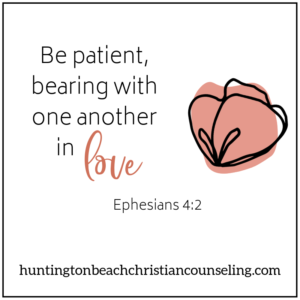Bible Verses About Marriage: God’s Vision and Instructions
Marriage is not something man-made. It is the central theme of God’s Word, woven throughout the Scriptures. Following are some key Bible verses about marriage.
Key Bible Verses about Marriage
In the beginning

In the beginning, God created man (Adam) but said it was not good for him to be alone, so He created a woman (Eve) to be his helpmate. Both of them were created in God’s image, with equal dignity, but with complementary physiological and psychological differences. For support, consider reaching out to Huntington Beach Christian Counseling for guidance rooted in biblical principles.
The first marriage took place between them in the Garden of Eden. It was a covenant relationship between one man and one woman, united by God in a mysterious way that belongs to no other human relationship. They were to establish a family unit, and their loyalty was to be to each other before anyone else except God.
God created man in his own image, in the image of God he created him; male and female he created them. – Genesis 1:27, ESV
Then the Lord God said, “It is not good that the man should be alone; I will make him a helper fit for him.” – Genesis 2:18, ESV
Therefore a man shall leave his father and his mother and hold fast to his wife, and they shall become one flesh. – Genesis 2:24, ESV
But from the beginning of creation, ‘God made them male and female.’ ‘Therefore a man shall leave his father and mother and hold fast to his wife, and the two shall become one flesh.’ So they are no longer two but one flesh. What therefore God has joined together, let not man separate.” – Mark 10:6-9, ESV
When Adam and Eve disobeyed God and made way for sin and death to enter the world, God created a new picture of what marriage should look like by establishing a covenant relationship with the children of Israel. As part of the contract, He promised to be faithful and to set them apart as His holy people.
The Israelites were rebellious and frequently broke the covenant, but God remained faithful and was always willing  to forgive them and take them back when they repented. Despite their many betrayals, He pursued them relentlessly, showing them mercy over and over.
to forgive them and take them back when they repented. Despite their many betrayals, He pursued them relentlessly, showing them mercy over and over.
So great was the depth of God’s love that He sent Jesus to die on the cross to redeem His people from their sins and restore their broken relationship with Him. By His death, Jesus became the living manifestation of the faithful bridegroom who was willing to give up His life for His beloved.
For God so loved the world, that he gave his one and only Son, that whoever believes in him shall not perish but have eternal life. – John 3:16, NIV
Through Jesus’ death and resurrection, a new covenant was formed to include people from every tribe, tongue, kindred, and nation. Everyone who believes in Him and receives Him as their Lord and Savior become part of the Body of Christ, destined to be united to Him as His bride.
Let us rejoice and be glad and give him glory! For the wedding of the Lamb has come, and his bride has made herself ready. Fine linen, bright and clean, was given her to wear. – Revelation 19:7-8, NIV
God’s vision for marriage
As the following Bible verses about marriage show, God’s vision for marriage is for it to be a permanent bond that endures and that mirrors the covenant relationship between Christ and the Church. When husband and wife live in harmony and unity with God, their union becomes like a cord of three strands that nothing can overpower or damage
Two are better than one, because they have a good reward for their toil. For if they fall, one will lift up his fellow. But woe to him who is alone when he falls and has not another to lift him up! Again, if two lie together, they keep warm, but how can one keep warm alone? And though a man might prevail against one who is alone, two will withstand him – a threefold cord is not quickly broken. — Ecclesiastes 4:9-12, ESV
Bible verses about marriage.
Both men and women are created in God’s image and are heirs together of eternal life. However, God appointed the husband to be the spiritual leader of the family and instructs the wife to affirm and receive this leadership for the harmonious working of the relationship. The husband, on the other hand, is commanded to treat his wife with love, respect, and understanding, and to show her special honor and care.
Wives, submit yourselves to your own husbands as you do to the Lord. For the husband is the head of the wife as Christ is the head of the church, his body, of which he is the Savior. Now as the church submits to Christ, so also wives should submit to their husbands in everything.
Husbands, love your wives, just as Christ loved the church and gave himself up for her to make her holy, cleansing her by the washing with water through the word, and to present her to himself as a radiant church, without stain or wrinkle or any other blemish, but holy and blameless. In this same way, husbands ought to love their wives as their own bodies.
He who loves his wife loves himself. After all, no one ever hated their own body, but they feed and care for their body, just as Christ does the church – for we are members of his body. “For this reason a man will leave his father and mother and be united to his wife, and the two will become one flesh.” This is a profound mystery – but I am talking about Christ and the church. However, each one of you also must love his wife as he loves himself, and the wife must respect her husband, — Ephesians 5:22-33, NIV
Wives, submit to your husbands, as is fitting in the Lord. Husbands love your wives, and do not be harsh with them. – Colossians 3:18-19, ESV
Husbands…be considerate as you live with your wives, and treat them with respect as the weaker partner and as heirs with you of the gracious gifts of life, so that nothing will hinder your prayers. – 1 Peter 3:7, NIV
More Bible verses about marriage

Consider some more Bible verses about marriage. There is no place for meanness or contempt between a husband and wife. Be patient and considerate of one another. You’ll make mistakes and your spouse will too. A happy marriage is the result of your commitment to be there for one another through the good times and bad, and to treat each other with love and respect.
Be devoted to one another in love. Honor one another above yourselves. – Romans 12:10, NIV
Be completely humble and gentle; be patient, bearing with another in love. Make every effort to keep the unity of the Spirit through the bond of peace. – Ephesians 4:2-3, NIV
Be kind to one another, tenderhearted, forgiving one another, as God in Christ forgave you. – Ephesians 4:32, ESV
Above all, love each other deeply, because love covers over a multitude of sins. – 1 Peter 4:8, NIV
God designed marriage as the place for the expression of human sexuality.
But because of the temptation to sexual immorality, each man should have his own wife and each woman her own husband. The husband should give to his wife her conjugal rights, and likewise the wife to her husband. For the wife does not have authority over her own body, but the husband does.
Likewise the husband does not have authority over his own body, but the wife does. Do not deprive one another, except perhaps by agreement for a limited time, that you may devote yourselves to prayer; but then come together again, so that Satan may not tempt you because of your lack of self-control. – 1 Corinthians 7:2-5, ESV
Let marriage be held in honor among all, and let the marriage bed be undefiled, for God will judge the sexually immoral and adulterous. – Hebrews 13:4, ESV
If you have questions, would like to learn more Bible verses about marriage, or would like to set up an appointment to see one of our Christian counselors at Huntington Beach Christian Counseling, please give us a call today.
“Church”, Courtesy of Alp Duran, Unsplash.com, CC0 License; “Bible”, Courtesy of Emmanuel Phaeton, Unsplash.com, CC0 License; “Bible and Computer”, Courtesy of Fallon Michael, Pexels.com, CC0 License; “Open Bible”, Courtesy of Herbert Santos, Pexels.com, CC0 License


 There are three C’s that we will be covering today: Compatibility, Compromising, and the most powerful one, Complimentary. These three stages of relationship maturity can help put some perspective to see where you are at in your marriage to see what is next for us to move on.
There are three C’s that we will be covering today: Compatibility, Compromising, and the most powerful one, Complimentary. These three stages of relationship maturity can help put some perspective to see where you are at in your marriage to see what is next for us to move on. By now I’m sure you see that these issues can slowly begin to turn a marriage into a rusty and withered relationship. How can compatibility save your marriage? This can save your marriage because you can talk to your spouse about how both of you had a great start but how you need to move forward. The start needs to be celebrated. Reflect on the enjoyable times you had together which will help you both to bond again.
By now I’m sure you see that these issues can slowly begin to turn a marriage into a rusty and withered relationship. How can compatibility save your marriage? This can save your marriage because you can talk to your spouse about how both of you had a great start but how you need to move forward. The start needs to be celebrated. Reflect on the enjoyable times you had together which will help you both to bond again. A positive tone will help a lot with communication because it can win someone over. The main issue with the stage of compromise is that it can take you far but not all the way. It’s great to compromise however, one spouse may get burned out if they don’t have the constant refreshment.
A positive tone will help a lot with communication because it can win someone over. The main issue with the stage of compromise is that it can take you far but not all the way. It’s great to compromise however, one spouse may get burned out if they don’t have the constant refreshment. Think about that vision for a moment. Both spouses work together to help elevate each other. What kind of marriage do you think they’ll have? It won’t be just a surviving marriage; it will be a thriving marriage! This is the secret to saving your marriage. Both of you must sit down, most likely with another couple, and process this vision to help both learn to inspire each other. This cannot be done alone. Both partners must work together so both of you can prosper.
Think about that vision for a moment. Both spouses work together to help elevate each other. What kind of marriage do you think they’ll have? It won’t be just a surviving marriage; it will be a thriving marriage! This is the secret to saving your marriage. Both of you must sit down, most likely with another couple, and process this vision to help both learn to inspire each other. This cannot be done alone. Both partners must work together so both of you can prosper. Recall your wedding day. Remember both of you standing on the altar and looking into his eyes as he was saying to you that he would be faithful and loving until the day he dies. I am sure at this moment you don’t feel that at all and that is okay. This article is not to persuade you about your valid emotions.
Recall your wedding day. Remember both of you standing on the altar and looking into his eyes as he was saying to you that he would be faithful and loving until the day he dies. I am sure at this moment you don’t feel that at all and that is okay. This article is not to persuade you about your valid emotions. Secondly, your husband needs you to be his greatest support. God is there with you all. The human being that needs him now more than ever is you. You have been an outstanding wife. You are a great mom, you cook and clean, you help pay the bills and do the dirty work around the home. You have grown in sexual intimacy with your husband and given him your best. You didn’t deserve this – you deserve better!
Secondly, your husband needs you to be his greatest support. God is there with you all. The human being that needs him now more than ever is you. You have been an outstanding wife. You are a great mom, you cook and clean, you help pay the bills and do the dirty work around the home. You have grown in sexual intimacy with your husband and given him your best. You didn’t deserve this – you deserve better! At first, it may start as an innocent crush or curiosity. Later, however, it develops into a relentless cycle of addiction that leaves them hopeless. Men need to be built up and encouraged for them to feel safe enough to be open. I encourage any reader to ask that question to see how your husband would respond. He may cry or he may get angry but that’s the point. He is feeling stuff and not dealing with it.
At first, it may start as an innocent crush or curiosity. Later, however, it develops into a relentless cycle of addiction that leaves them hopeless. Men need to be built up and encouraged for them to feel safe enough to be open. I encourage any reader to ask that question to see how your husband would respond. He may cry or he may get angry but that’s the point. He is feeling stuff and not dealing with it. Over time, he may give in and be curious about getting help. This step empowers you, but it also frees you from being a victim. You are not a victim! I will say it again, you are not a victim! You are a noble woman of God who is experiencing what many other women have or are currently experiencing in their lives.
Over time, he may give in and be curious about getting help. This step empowers you, but it also frees you from being a victim. You are not a victim! I will say it again, you are not a victim! You are a noble woman of God who is experiencing what many other women have or are currently experiencing in their lives. Think about the following: fame, fortune, popularity, success, power, family, and so forth. Why do we want all these things? We want them because we want to be loved. Maybe we won’t admit it but at the end of the day, we work hard because we are searching for that endless love. There are some interesting proverbs in the Bible that support this.
Think about the following: fame, fortune, popularity, success, power, family, and so forth. Why do we want all these things? We want them because we want to be loved. Maybe we won’t admit it but at the end of the day, we work hard because we are searching for that endless love. There are some interesting proverbs in the Bible that support this. Another possibility is that maybe you or someone who is in an emotional affair and you’re wondering if you’ve gone too far. This article interested you because you are at a crossroads in your relationship, and you may have ventured out of the boundaries in an emotional relationship and now you are contemplating on what you are going to do.
Another possibility is that maybe you or someone who is in an emotional affair and you’re wondering if you’ve gone too far. This article interested you because you are at a crossroads in your relationship, and you may have ventured out of the boundaries in an emotional relationship and now you are contemplating on what you are going to do. Adultery doesn’t just happen, it evolves, and these scriptures point out that it started within us. It could be why in the gospel it says that the most important commandment is to love our Lord with all our Heart, Soul, Mind, and Strength. God wants all of us. He doesn’t accept partial love.
Adultery doesn’t just happen, it evolves, and these scriptures point out that it started within us. It could be why in the gospel it says that the most important commandment is to love our Lord with all our Heart, Soul, Mind, and Strength. God wants all of us. He doesn’t accept partial love. This approach is excellent for those who have been hurt by emotional infidelity because they feel the pain of being betrayed. They can explore those feelings and realize past trauma tied into the current hurt. The process continues as to what they are thinking and possible actions they can take to empower themselves. This is one of many possible approaches but in my work with hundreds of clients, I can’t think of a better approach.
This approach is excellent for those who have been hurt by emotional infidelity because they feel the pain of being betrayed. They can explore those feelings and realize past trauma tied into the current hurt. The process continues as to what they are thinking and possible actions they can take to empower themselves. This is one of many possible approaches but in my work with hundreds of clients, I can’t think of a better approach.
 Marriage is God’s invention, and because it is God’s intention that it be permanent, you should feel compelled to make the effort to save it. Many divorces occur because people didn’t seek help when they needed it but tried to do it solely on their own. As God’s Word says, “Without consultation, plans are frustrated, but with many counselors, they succeed” (Proverbs 15:22).
Marriage is God’s invention, and because it is God’s intention that it be permanent, you should feel compelled to make the effort to save it. Many divorces occur because people didn’t seek help when they needed it but tried to do it solely on their own. As God’s Word says, “Without consultation, plans are frustrated, but with many counselors, they succeed” (Proverbs 15:22). Though it may seem simplistic, probably the best way to identify a trusted counselor is through word of mouth. Who have others used? Who do they recommend?
Though it may seem simplistic, probably the best way to identify a trusted counselor is through word of mouth. Who have others used? Who do they recommend? It is a good idea to take advantage of any free consultations over the phone prior to meeting with a counselor in order to get to know them a little bit and get a feel for whether the counseling relationship is likely to work out. This gives you the liberty to ensure that you are comfortable with this counselor before you commit to anything long-term.
It is a good idea to take advantage of any free consultations over the phone prior to meeting with a counselor in order to get to know them a little bit and get a feel for whether the counseling relationship is likely to work out. This gives you the liberty to ensure that you are comfortable with this counselor before you commit to anything long-term.




 One common reason why people are reluctant to seek out a family therapist is that they’re not sure what to look for in a counselor. Unfortunately, another common reason comes down to bad experiences in the past with counselors, which causes anxiety about having a repeat experience.
One common reason why people are reluctant to seek out a family therapist is that they’re not sure what to look for in a counselor. Unfortunately, another common reason comes down to bad experiences in the past with counselors, which causes anxiety about having a repeat experience. Many people see couples’ therapy as something which married couples engage in when their relationship has already broken down. It’s seen as a last resort to save the marriage. However, couples’ therapy is not only for couples who have reached this level of breakdown.
Many people see couples’ therapy as something which married couples engage in when their relationship has already broken down. It’s seen as a last resort to save the marriage. However, couples’ therapy is not only for couples who have reached this level of breakdown. People in crisis often struggle in various different areas of their lives, and this may include education, legal and child protective services. Having the involvement of these systems can cause confusion and raise even more difficulties. You may feel that these outside organizations are taking over and pushing you around.
People in crisis often struggle in various different areas of their lives, and this may include education, legal and child protective services. Having the involvement of these systems can cause confusion and raise even more difficulties. You may feel that these outside organizations are taking over and pushing you around. Therapy is a little like preventative medicine. Investing in therapy now can save a lot of expense and pain in the future. Therapy can also be made more affordable with a little knowledge.
Therapy is a little like preventative medicine. Investing in therapy now can save a lot of expense and pain in the future. Therapy can also be made more affordable with a little knowledge. To really understand what this means, picture a little girl whose father is not around most of the time, is authoritarian, doesn’t show any interest in her recitals, and whose mother is there but is always preoccupied with her own personal issues.
To really understand what this means, picture a little girl whose father is not around most of the time, is authoritarian, doesn’t show any interest in her recitals, and whose mother is there but is always preoccupied with her own personal issues. To satisfy oneself sexually is not the only obvious payoff. Having an affair also tends to heal the wounded part of the self that encourages the behavior more than anything else. Another payoff is the thrill that comes with indulging in the forbidden actually building up the erotic energy in the relationship.
To satisfy oneself sexually is not the only obvious payoff. Having an affair also tends to heal the wounded part of the self that encourages the behavior more than anything else. Another payoff is the thrill that comes with indulging in the forbidden actually building up the erotic energy in the relationship. Both of these results are terrible and God wants something much better for us. The traditional marriage vows that say “to have and to hold, to love, honor and cherish, forsaking all others.” is already a great reminder for us to keep. If you or your spouse doesn’t feel loved, honored, or cherished, it’s best to take action right away, probably through the help of a counselor.
Both of these results are terrible and God wants something much better for us. The traditional marriage vows that say “to have and to hold, to love, honor and cherish, forsaking all others.” is already a great reminder for us to keep. If you or your spouse doesn’t feel loved, honored, or cherished, it’s best to take action right away, probably through the help of a counselor. Being married, whether you did it in a church or not, means you made a promise before God. He cares deeply about your relationship. Allow him to be in it. Ask for His help to love right, to be more forgiving, to fight your own selfishness, put up good boundaries, and be responsible for your own emotional struggles.
Being married, whether you did it in a church or not, means you made a promise before God. He cares deeply about your relationship. Allow him to be in it. Ask for His help to love right, to be more forgiving, to fight your own selfishness, put up good boundaries, and be responsible for your own emotional struggles. Perhaps they feel like their spouse doesn’t really know or love them. An affair offers the illusion of feeling desired, alive, and escaping from the mundane reality of everyday life.
Perhaps they feel like their spouse doesn’t really know or love them. An affair offers the illusion of feeling desired, alive, and escaping from the mundane reality of everyday life.  Even if your children don’t know what’s happening, they’ll sense the shaky foundation of your marriage. Your marriage should be the solid rock on which you can build your family. An affair cracks the foundation of the family, no matter what excuse you make for it.
Even if your children don’t know what’s happening, they’ll sense the shaky foundation of your marriage. Your marriage should be the solid rock on which you can build your family. An affair cracks the foundation of the family, no matter what excuse you make for it. People at church will also tend to be polarized by your illicit relationship. If you are a ministry leader or participant, you may be asked to step down as you deal with the fallout of your decision to commit adultery. Most people will likely side with your spouse, not you.
People at church will also tend to be polarized by your illicit relationship. If you are a ministry leader or participant, you may be asked to step down as you deal with the fallout of your decision to commit adultery. Most people will likely side with your spouse, not you. No one just wakes up one morning and arbitrarily decides, “I’m going to have an affair.” Most of us have internal inhibitions against cheating. What happens is that we take one seemingly harmless step at a time, and before we know it, we’re entangled in adultery.
No one just wakes up one morning and arbitrarily decides, “I’m going to have an affair.” Most of us have internal inhibitions against cheating. What happens is that we take one seemingly harmless step at a time, and before we know it, we’re entangled in adultery. When you make a conscious choice to seek help as a married couple, it signals a pivotal moment in your relationship. Though counseling will never be easy, it is the commitment to a better marriage that is the most crucial aspect of seeking additional assistance.
When you make a conscious choice to seek help as a married couple, it signals a pivotal moment in your relationship. Though counseling will never be easy, it is the commitment to a better marriage that is the most crucial aspect of seeking additional assistance. However, if one spouse has pressured the other into attending, and if they have absolutely no desire to be there, it can do more harm than good.
However, if one spouse has pressured the other into attending, and if they have absolutely no desire to be there, it can do more harm than good. If one of the individuals involved in the marriage is dealing with serious emotional trauma from before or during the marriage, their well-being must be prioritized. They may be going through something that requires individual therapeutic work.
If one of the individuals involved in the marriage is dealing with serious emotional trauma from before or during the marriage, their well-being must be prioritized. They may be going through something that requires individual therapeutic work.